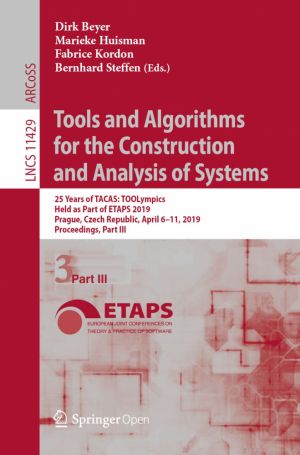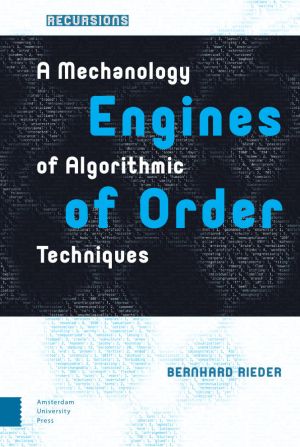Engines of Order
A Mechanology of Algorithmic Techniques
by Bernhard Rieder
DescriptionTable of ContentsDetailsHashtagsReport an issue 





Book Description
Software has become a key component of contemporary life and algorithmic techniques that rank, classify, or recommend anything that fits into digital form are everywhere. This book approaches the field of information ordering conceptually as well as historically. Building on the philosophy of Gilbert Simondon and the cultural techniques tradition, it first examines the constructive and cumulative character of software and shows how software-making constantly draws on large reservoirs of existing knowledge and techniques. It then reconstructs the historical trajectories of a series of algorithmic techniques that have indeed become the building blocks for contemporary practices of ordering. Developed in opposition to centuries of library tradition, coordinate indexing, text processing, machine learning, and network algorithms instantiate dynamic, perspectivist, and interested forms of arranging information, ideas, or people. Embedded in technical infrastructures and economic logics, these techniques have become engines of order that transform the spaces they act upon.This open book is licensed under a Open Publication License (OPL). You can download Engines of Order ebook for free in PDF format (3.0 MB).
Table of Contents
Chapter 1
Engines of Order
Chapter 2
Rethinking Software
Chapter 3
Software-Making and Algorithmic Techniques
Chapter 4
From Universal Classification to a Postcoordinated Universe
Chapter 5
From Frequencies to Vectors
Chapter 6
Interested Learning
Chapter 7
Calculating Networks: From Sociometry to PageRank
Book Details
Title
Engines of Order
Publisher
Amsterdam University Press
Published
2020
Pages
353
Edition
1
Language
English
ISBN13
9789462986190
ISBN10
9462986193
ISBN13 Digital
9789048537419
ISBN10 Digital
904853741X
PDF Size
3.0 MB
License
Open Publication License
Related Books

This book offers comprehensive coverage on Ordered Fuzzy Numbers, providing readers with both the basic information and the necessary expertise to use them in a variety of real-world applications. The respective chapters, written by leading researchers, discuss the main techniques and applications, together with the advantages and shortcomings of t...

This is an optimization manual for advanced C++ programmers. This book are not for beginners.
Topics include:
- The choice of platform and operating system.
- Choice of compiler and framework.
- Finding performance bottlenecks.
- The efficiency of different C++ constructs.
- Multi-core systems.
- Parallelization with vector operations.
- CPU dispa...

This open access volume explores how UN peace operations are adapting to four trends in the changing global order: (1) the rebalancing of relations between states of the global North and the global South; (2) the rise of regional organisations as providers of peace; (3) the rise of violent extremism and fundamentalist non-state actors; and (4) incr...

How do social networking services earn money?What is the "second hand of the market" and how does it operate? Why does society need so many different kinds of goods? What does happiness economics not reveal about happiness?What is the link between talent, success and "stardom"? What is the business development model for the ent...

This book constitutes the refereed proceedings of the 7th International Conference on Tools and Algorithms for the Construction and Analysis of Systems, TACAS 2001. The 36 revised full papers presented together with an invited contribution were carefully reviewed and selected from a total of 125 submissions. The papers are organized in sections on ...

Legal studies and consequently legal history focus on constitutional documents, believing in a nominalist autonomy of constitutional semantics.Reconsidering Constitutional Formation in the late 18th and 19th century, kept historic constitutions from being simply log-books for political experts through a functional approach to the interdependencies ...

